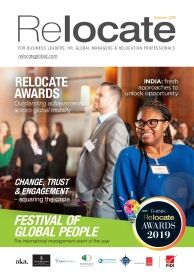India: fresh approaches to unlock opportunity
Ruth Holmes reports on the valuable insights gleaned from the India panel at the Festival of Global People, with expert panellists, Rohit Kumar of IKAN Relocations, Simon Johnston of ICON Relocation, and Holly Creed of DXC Technology.

Watch highlights from the India panel:
Holly Creed, global mobility manager at DXC Technology – the client services company spun out of Hewlett-Packard in 2017 – is also already seeing how outbound mobility from India into Europe and the US is changing approaches to global mobility. “It’s quite clear there is a large shift in talent and more companies are looking at India, not just as a country to outsource back-office functions in, but as a source of talent and potentially a future workforce,” said Creed. “In the US in 2015, across multiple states, Indian nationals accounted for the third or fourth largest population. In Texas, this group is the second largest after Mexican nationals. It’s very clear that India is a force for the future.”With the outcome of government elections now clear and returning Prime Minister Narendra Modi’s government seeking to deliver its “New India” agenda – one based on economic reform and greater global influence – we could now see more inbound assignments, too. “I know for a fact there are at least 200 US companies who are waiting to shift their operations from China to India,” said Kumar, highlighting the opportunities India promises.What are the challenges for inbound Indian talent?
Simon Johnston and his team are also involved daily with moving globally mobile populations out of India and inbound to the UK.Aware of the scale of opportunity and looking to improve practice, he identified three key issues; each a prospect to help make mobility work better for individuals and their employers.The first is the high demand for skilled people from India in the UK and a shortage across most industries, including healthcare, but particularly IT. This means employers have to get talent mobility right to remain competitive.The second is the personal circumstances of many assignees. “Relocating individuals inbound from India tend to be highly educated, fairly young professional people in what is likely to be their very first relocation,” observed Johnston. “This is a generalisation, but these are the broad characteristics of the assignees I’m seeing.”Delhi-based Kumar observed that for most outbound transferees – around 90% – this assignment would be their first trip outside India or their home city. “Young people, therefore, need help to survive,” he said. “While sometimes this might come from friends and family already in Europe, employers and global mobility service providers also have important roles.”The five Rs of global mobility?
The third issue Johnston identifies relates to the speed of relocation decision-making: one that in tandem with the first two challenges accents employers’ duty of care more than it has in the past. Johnston believes the often-rapid relocation demands a much more empathetic approach to assignment management. This ensures that as well as having the “right person in the right place at the right time” – the three Rs of relocation – they are in the “right mindset and ready for a positive repatriation” when the time comes.“People from India into the UK and Europe often relocate at incredibly short notice,” he said. “Looking at some of our major clients, the lead time for getting their work permit to arriving here is just five days, on average. Thinking about that in relation to average times for other sectors, we have to give people extra duty of care.”Johnston continued, “These people are top-tier talent. We need to back them up, be there for them and give people the support they need. They are an amazingly talented group and, as global mobility experts, we should be doing more to welcome them.”Closing the gap between expectations and reality
A new study from Weichert Global Mobility, Propelling India Mobility: Challenges, trends and best practices, cited by Creed during the panel, suggests that there is indeed a “significant” gap in practice between the support relocating employees are looking for and what is available. This is something Creed has been addressing at DXC Technology in conversations with leadership, winning the Relocate Award for Best HR, Talent or Mobility Initiative in the process.“Weichert’s study finds that mobility professionals are not aligned with what their workforce wants in terms of assignment benefits,” she explained. “There’s a need to revisit processes and streamline policies, because a lot of deals are being made outside of existing arrangements.” Creed added: “If we want to manage this interesting workforce now and in the future, as professionals, we really need to start adapting and find out how we can align our policies with what people want.”What do Indian nationals want on outbound moves?
While self-managed and business travellers are the core of India’s outbound mobile population, there is a shift in attitude towards asking for more destination and financial support. “Ten years ago, people were given basic information and advice about coming to the UK,” observed Johnston. “Today, clients expect people to be there to help them.”For Creed, this change in expectation has risen as India’s tech talent recognise their value to their employers and shifts in demographics. “A few years ago, you could easily get someone Indian outbound to go with a package at the threshold for immigration. But now there is pushback. We are being asked for accommodation and education support and destination services – your typical expat benefits,” she said.Echoing this during the Q&A after the panel discussion, Eva Stock, director of business engagement at expat community FOCUS, said she is increasingly seeing families relocate from India, counterbalancing the standard single person assignment.Kumar believes given how over-subscribed good schools are in both the UK and India, education could rise up the agenda. “This is not a challenge yet,” he said. “But could be.”How are HR and global mobility responding?
Weichert’s study assesses the characteristics of successful inbound mobility programmes. It found that support which included country- and city-specific policy provisions is particularly important for Indian nationals, especially in the US, as they are often on home-country salaries and need additional allowances and benefits in kind. “This is alongside the higher level of hand-holding required,” continued Creed. “An employee who has travelled extensively outside of work might find relocation easier. But as Kumar said, a lot of people might never have left their city. So, coming to the UK, the US, Europe or elsewhere in APAC, is going to be quite unnerving for them. And also, as Johnston said, that duty of care is so much more important as we move more and more people India outbound.”DXC Technology is already responding to the challenges in changing the level of support it offers. Recognising that in an age of cost-control, actually investing more upfront in the global mobility offer makes sound business sense, Creed has convinced the company’s leadership to revise its packages upwards for Indian talent outbound – and with positive results for both the company and assignees. “We’ve found that now we’ve started adding more, our retention is actually increasing and seeing employees who are a lot happier,” she explained.For Johnston, the changes are also on the suppliers’ side. Service providers, employers and assignees need to work ever more closely together and with agility to establish the foundations of a successful relocation in a short timeframe. “We need to stay close to the HR department, so we know what the person relocating values and what to expect in the UK,” he said. “Then, we need that connectivity in the supply chain and to talk about how we can getthe assignee connected in the UK, whether it’s in a home ready for them to move straight into with all the utilities connected, fridge stocked, mobile phone and bank account set up, and the person oriented to the local area.“If we are going to engage with people, we need to reach out before they arrive in the UK. We need to know the technology space so we can reach people 24-7 on a platform, if not in person. And do all this quickly.”Johnston adds: “We find where this happens, assignees are highly positive about being in the UK. When they go back, we all want them to say to their peers and colleagues ‘you should be doing that.’ As employers and as an industry, we should all be giving people our support.”This article is taken from a series surrounding Relocate’s Festival of Global People held on 14 & 15 May 2019 in London. The highly successful, interactive event included speakers such as Dr Linda Holbeche, author of The Agile Organization, Ben Renshaw, author of Purpose, Teresa Boughey, CEO of Jungle HR, and Angela Middleton MBE.For more information and to find out how you can get involved in this unique event next year, contact: events@relocatemagazine.com
Subscribe to Relocate Extra, our monthly newsletter, to get all the latest international assignments and global mobility news.Relocate’s new Global Mobility Toolkit provides free information, practical advice and support for HR, global mobility managers and global teams operating overseas.
 Access hundreds of global services and suppliers in our Online Directory
Access hundreds of global services and suppliers in our Online Directory ©2019. This article first appeared in the Summer 2019 edition of Relocate magazine, published by Profile Locations, Spray Hill, Hastings Road, Lamberhurst, Kent TN3 8JB. All rights reserved. This publication (or any part thereof) may not be reproduced in any form without the prior written permission of Profile Locations. Profile Locations accepts no liability for the accuracy of the contents or any opinions expressed herein.
©2019. This article first appeared in the Summer 2019 edition of Relocate magazine, published by Profile Locations, Spray Hill, Hastings Road, Lamberhurst, Kent TN3 8JB. All rights reserved. This publication (or any part thereof) may not be reproduced in any form without the prior written permission of Profile Locations. Profile Locations accepts no liability for the accuracy of the contents or any opinions expressed herein.























